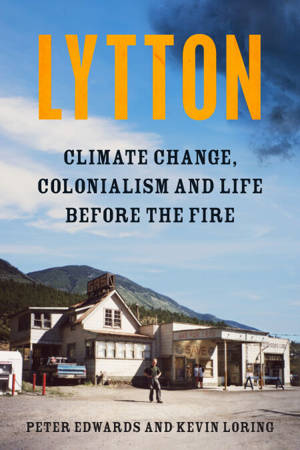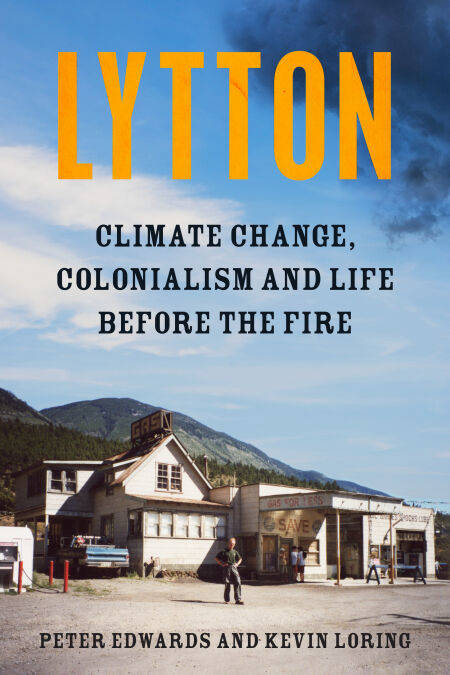
Bedankt voor het vertrouwen het afgelopen jaar! Om jou te bedanken bieden we GRATIS verzending (in België) aan op alles gedurende de hele maand januari.
- Afhalen na 1 uur in een winkel met voorraad
- In januari gratis thuislevering in België
- Ruim aanbod met 7 miljoen producten
Bedankt voor het vertrouwen het afgelopen jaar! Om jou te bedanken bieden we GRATIS verzending (in België) aan op alles gedurende de hele maand januari.
- Afhalen na 1 uur in een winkel met voorraad
- In januari gratis thuislevering in België
- Ruim aanbod met 7 miljoen producten
Zoeken
Lytton E-BOOK
Climate Change, Colonialism and Life Before the Fire
Peter Edwards, Kevin Loring
E-book | Engels
€ 25,63
+ 25 punten
Uitvoering
Omschrijving
NATIONAL BESTSELLER
From bestselling true-crime author Peter Edwards and Governor General's Award-winning playwright Kevin Loring, two sons of Lytton, the BC town that burned to the ground in 2021, comes a meditation on hometown―when hometown is gone.
“It’s dire,” Greta Thunberg retweeted Mayor Jan Polderman. “The whole town is on fire. It took a whole 15 minutes from the first sign of smoke to, all of a sudden, there being fire everywhere.”
Before it made global headlines as the small town that burned down during a record-breaking heat wave in June 2021, while briefly the hottest place on Earth, Lytton, British Columbia, had a curious past. Named for the author of the infamous line, “It was a dark and stormy night,” Lytton was also where Peter Edwards, organized-crime journalist and author spent his childhood. Although only about 500 people lived in Lytton, Peter liked to joke that he was only the second-best writer to come from his tiny hometown. His grade-school classmate’s nephew Kevin Loring, Nlaka’pamux from Lytton First Nation, had grown up to be a Governor General’s Award–winning playwright.
The Nlaka’pamux called Lytton “The Centre of the World,” a view Buddhists would share in the late twentieth century, as they set up a temple just outside town. A gold rush in 1858 saw conflict with a wave of Californians come to a head with the Canyon War at the junction of the mighty Fraser and Thompson rivers. The Nlaka’pamux lost over thirty lives in that conflict, as did the American gold seekers. In modern times, many outsiders would seek shelter there, often people who just didn’t fit anywhere else and were hoping for a little anonymity in the mountains.
Told from the shared perspective of an Indigenous playwright and the journalist son of a settler doctor who pushed back against the divisions that existed between populations, Lytton portrays all the warmth, humour and sincerity of small-town life. A colourful little town that burned to the ground could be every town’s warning if we don’t take seriously what this unique place has to teach us.
From bestselling true-crime author Peter Edwards and Governor General's Award-winning playwright Kevin Loring, two sons of Lytton, the BC town that burned to the ground in 2021, comes a meditation on hometown―when hometown is gone.
“It’s dire,” Greta Thunberg retweeted Mayor Jan Polderman. “The whole town is on fire. It took a whole 15 minutes from the first sign of smoke to, all of a sudden, there being fire everywhere.”
Before it made global headlines as the small town that burned down during a record-breaking heat wave in June 2021, while briefly the hottest place on Earth, Lytton, British Columbia, had a curious past. Named for the author of the infamous line, “It was a dark and stormy night,” Lytton was also where Peter Edwards, organized-crime journalist and author spent his childhood. Although only about 500 people lived in Lytton, Peter liked to joke that he was only the second-best writer to come from his tiny hometown. His grade-school classmate’s nephew Kevin Loring, Nlaka’pamux from Lytton First Nation, had grown up to be a Governor General’s Award–winning playwright.
The Nlaka’pamux called Lytton “The Centre of the World,” a view Buddhists would share in the late twentieth century, as they set up a temple just outside town. A gold rush in 1858 saw conflict with a wave of Californians come to a head with the Canyon War at the junction of the mighty Fraser and Thompson rivers. The Nlaka’pamux lost over thirty lives in that conflict, as did the American gold seekers. In modern times, many outsiders would seek shelter there, often people who just didn’t fit anywhere else and were hoping for a little anonymity in the mountains.
Told from the shared perspective of an Indigenous playwright and the journalist son of a settler doctor who pushed back against the divisions that existed between populations, Lytton portrays all the warmth, humour and sincerity of small-town life. A colourful little town that burned to the ground could be every town’s warning if we don’t take seriously what this unique place has to teach us.
Specificaties
Betrokkenen
- Auteur(s):
- Uitgeverij:
Inhoud
- Aantal bladzijden:
- 320
- Taal:
- Engels
Eigenschappen
- Productcode (EAN):
- 9781039006164
- Verschijningsdatum:
- 24/06/2024
- Uitvoering:
- E-book
- Beveiligd met:
- Adobe DRM
- Formaat:
- ePub

Alleen bij Standaard Boekhandel
+ 25 punten op je klantenkaart van Standaard Boekhandel
Beoordelingen
We publiceren alleen reviews die voldoen aan de voorwaarden voor reviews. Bekijk onze voorwaarden voor reviews.









